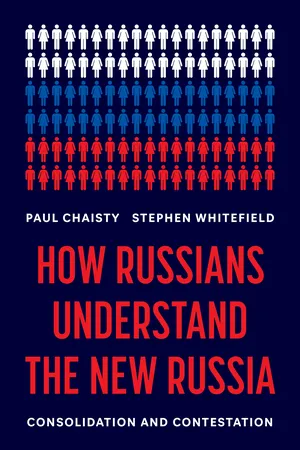
How Russians Understand the New Russia
Consolidation and Contestation
- English
- ePUB (mobile friendly)
- Available on iOS & Android
How Russians Understand the New Russia
Consolidation and Contestation
About this book
The issues that are the most and the least divisive in Russia
The collapse of the Soviet Union in 1991 created a new Russia, with new territorial boundaries and new political and economic systems. The hybrid political economy that emerged incorporated commitments to markets and democracy that were undermined by the state’s economic interventions and authoritarian restrictions.
In this book, Paul Chaisty and Stephen Whitefield argue that the hybridity of the post-Soviet system provided a strong basis for the consolidation of Russian public opinion—and for the management of contestation so that it did not threaten the system itself. Drawing on almost thirty years of original public opinion research in Russia, Chaisty and Whitefield also find, however, that the territorial dimension of Russia’s postcommunist transformation has disrupted public support for the hybrid political economy. In particular, they trace the reopening of system-level disagreement between system supporters and system opponents to the nationalist turn in Russian politics that culminated in the 2014 annexation of Crimea and the reactivation of Soviet identities.
How Russians Understand the New Russia provides the first longitudinal study of Russian public opinion on the system of political and economic power that replaced communism. It offers unique insights into how Russian citizens have adapted their views of the new Russia, identifying the issues that are the most—and the least—divisive. Chaisty and Whitefield track Russian public opinion on a broad range of policy questions, discuss the political importance of both voting and not voting and consider problems of nation-building and national identity. Finally, they weigh the impact of the Ukraine war on Russia’s hybrid system, and whether consolidation or further contestation is more likely.
Frequently asked questions
- Essential is ideal for learners and professionals who enjoy exploring a wide range of subjects. Access the Essential Library with 800,000+ trusted titles and best-sellers across business, personal growth, and the humanities. Includes unlimited reading time and Standard Read Aloud voice.
- Complete: Perfect for advanced learners and researchers needing full, unrestricted access. Unlock 1.4M+ books across hundreds of subjects, including academic and specialized titles. The Complete Plan also includes advanced features like Premium Read Aloud and Research Assistant.
Please note we cannot support devices running on iOS 13 and Android 7 or earlier. Learn more about using the app.
Information
Table of contents
- Cover
- Title Page
- Copyright
- Dedication
- Contents
- List of Figures
- List of Tables
- Preface
- Introduction. Russia’s Great Transformation and the Development of Its Hybrid Political Economy
- 1. Theorising Consolidation and Contestation in Russia’s Hybrid Political Economy
- 2. Researching Public Opinion on Russia’s Triple Transformation
- 3. Hybridity and Support for Democracy and the Market
- 4. Explaining Policy Preferences: System-Level or ‘Normal’ Contestation?
- 5. How Russians Vote: Electoral Contestation and Non-Contestation in the Hybrid Political Economy
- 6. The Politics of Opting Out: Views of the System and Non-Voters
- 7. When Systems Collide: Hybridity and the Politics of State Identity
- Conclusion. The End of Hybridity. Forward to Democracy or Backwards to Authoritarianism? Russia in the Aftermath of the 2022 Ukraine Invasion
- Appendix
- Notes
- References
- Index